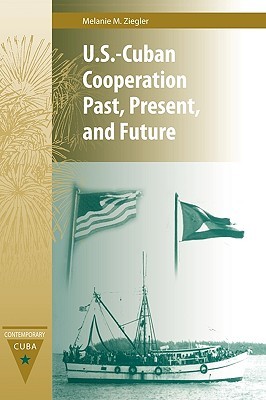
- We will send in 10–14 business days.
- Author: Melanie M Ziegler
- Publisher: University Press of Florida
- ISBN-10: 0813034515
- ISBN-13: 9780813034515
- Format: 15.2 x 22.9 x 1.1 cm, softcover
- Language: English
- SAVE -10% with code: EXTRA
U.S.-Cuban Cooperation Past, Present, and Future (e-book) (used book) | bookbook.eu
Reviews
Description
"I know of no other comprehensive and up-to-date narrative that covers all aspects of the U.S.-Cuba security relationship"--Philip Peters, Vice President of the Lexington Institute
The United States and Cuba actually cooperate on several issues of mutual interest. This intriguing pattern of U.S.-Cuban cooperation emerged during the 1990s. Naked self-interest led the two governments to cooperate in four areas: illegal immigration, drug trafficking, decreasing tensions around Guantánamo Naval Base, and reducing the threat of unintended war. The fact that there has been any cooperation between the United States and Cuba may be surprising since the public rhetoric of animosity has always dominated U.S.-Cuban discourse.
To date, there has been little systematic research on these areas of cooperation, from confidence building measures to how Cuban exile groups have attempted to undermine all levels of cooperation with the United States. Melanie Ziegler examines these issues and offers possible solutions in hopes of discovering the best pathway for avoiding future confrontation and for building normal relations in the twenty-first century. As the Fidel Castro era draws to a close, it is essential to examine and begin looking for new perspectives on U.S.-Cuban cooperation tactics.
Complete with a historical background, this book is a must-read for scholars, students, policy experts, and members of the U.S. military.
EXTRA 10 % discount with code: EXTRA
The promotion ends in 18d.06:14:41
The discount code is valid when purchasing from 10 €. Discounts do not stack.
- Author: Melanie M Ziegler
- Publisher: University Press of Florida
- ISBN-10: 0813034515
- ISBN-13: 9780813034515
- Format: 15.2 x 22.9 x 1.1 cm, softcover
- Language: English English
"I know of no other comprehensive and up-to-date narrative that covers all aspects of the U.S.-Cuba security relationship"--Philip Peters, Vice President of the Lexington Institute
The United States and Cuba actually cooperate on several issues of mutual interest. This intriguing pattern of U.S.-Cuban cooperation emerged during the 1990s. Naked self-interest led the two governments to cooperate in four areas: illegal immigration, drug trafficking, decreasing tensions around Guantánamo Naval Base, and reducing the threat of unintended war. The fact that there has been any cooperation between the United States and Cuba may be surprising since the public rhetoric of animosity has always dominated U.S.-Cuban discourse.
To date, there has been little systematic research on these areas of cooperation, from confidence building measures to how Cuban exile groups have attempted to undermine all levels of cooperation with the United States. Melanie Ziegler examines these issues and offers possible solutions in hopes of discovering the best pathway for avoiding future confrontation and for building normal relations in the twenty-first century. As the Fidel Castro era draws to a close, it is essential to examine and begin looking for new perspectives on U.S.-Cuban cooperation tactics.
Complete with a historical background, this book is a must-read for scholars, students, policy experts, and members of the U.S. military.


Reviews